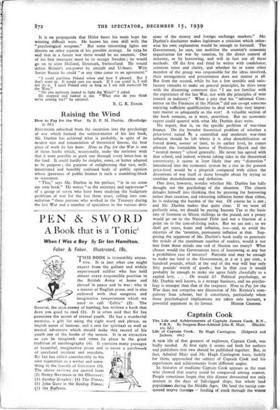Captain Cook
A NEW life of that greatest of explorers, Captain Cook, was badly needed. At first sight it seems sad both for authors and publishers that two should be published together. But, in
fact, Admiral Muir and Mr. Hugh Carrington have, luckily for them, approached the subject of Captain Cook and his experiences and achievements from different angles.
In histories of medicine Captain Cook appears as the man who showed that scurvy could be conquered among seamen.
People sometimes forget that this disease devastated not only seamen in the days of full-rigged ships, but whole land populations during the Middle Ages. On land the turnip con-
quered scurvy (turnips = feeding of stock through the winter
fresh meat instead of salt + fresh milk and butter). But until after the end of the eighteenth century, when better feeding had conquered the disease on land, it ravaged crews at sea. Exploration was as much hindered by it as by hurricanes, uncharted reefs, and the absence of chronometers all put together. Until I read Admiral Muir's book I assumed, from summaries of medical history, that Captain Cook had conquered scurvy simply by providing (before they were known to exist), first a sufficient ration of vitamins, and, second, by the use of a condenser apparatus for providing his crew with fresh water. Actually his method was more interest- ing and more complex. " Fatigue, cold and exposure rapidly exhaust the reserve stock of vitamin C." Cook, among other things, saw that his men kept three watches instead of two, and in the worst conditions had facilities for them to get dry, while he forced the Admiralty to provide them with all sorts of winter clothes. Admiral Muir's book, incidentally, sheds a great deal of light on the mutinies of the ' Bounty,' the Nore, and Spithead. The modern reader will sympathise with the conclusions he draws.
In Mr. Carrington's book this side of things is treated much more briefly. He writes as a New Zealander, and, though he knows much less of the conditions of a crew pent up for two or three years together in a ship, he knows a good deal more of the primitive cultures, Polynesian, Melanesian, and Maori, with which Cook came into contact. Besides this, he knows well, and obviously loves, many of the places at which Cook landed, and it is clear from internal evidence that he speaks or understands more than one of the South Sea languages and dialects.
As one would expect from the special interest of these two writers, it is Mr. Carrington who gives the best account of the final tragedy in which Captain Cook was killed in Hawaii. "Tradition had told the Hawaiians that one of their gods, Lono, the god of peace and happiness and agriculture, who had disappeared over the sea in time immemorial, was to return to them. The towering masts and branched spars of the ' Resolution' seemed to them islands, forests that had moved out into the sea, the men on them appeared to be gods, and as such they were treated." But celestial visitants have to be given offerings and feasts—valuable offerings, feasts that strain the community to the utmost. These gods not only stayed longer than the faithful wanted them (primitive people are often as frank to their idols as children are to their dolls), but were forced (through a violent gale damaging the ' Resolution's ' fore- mast), to put back to the place where they had been adored.
That was too much!
Both Admiral Muir and Mr. Carrington agree, however, that Cook was not killed deliberately. Tempers on both sides had grown frayed, and Cook's death was hardly more regretted on his own ships than by the islanders. Cook would, I think both these authors would agree, scarcely have resented his own death, so just was his estimate of the relation between the British and " these people." He wrote his views long before the final tragedy was in sight.
" It is impossible for them to know our real design ; we enter their ports without their daring to oppose ; we endeavour to land in their country as friends, and it is well if this succeeds ; we land nevertheless, and maintain the footing we have got, by the superiority of our firearms."
Cook employed firearms as seldom as possible, and, if he did, used small shot, not ball. Though on many occasions this saved his life and that of members of his ship's company, as well as his always upright conscience, it was in the et* the cause of his death. Anyone who likes, in a time of cri$s, to read about a great Englishman whose splendid deeds will yet never put him to the blush, will enjoy either, or better both, of these excellent biographies of a very remarkable man.
AMABEL WILLIAMS-ELLIS.









































 Previous page
Previous page